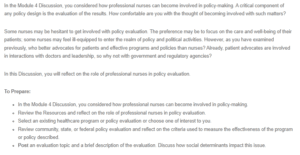The Role of the RN/APRN in Policy Evaluation – Affordable Care Act
I chose the Affordable Care Act (ACA) as the healthcare policy to be evaluated. ACA, popularly known as Obamacare, was a government program that was established in the United States. ACA evaluation is a critical examination of its impact on health equity in the United States. By expanding insurance coverage to millions of previously uninsured Americans, the ACA hoped to increase access to healthcare and minimize inequities in health outcomes (Dolan & Dolan, 2023). The importance of socioeconomic determinants on this issue, however, cannot be overlooked. Socioeconomic status, education, employment, and access to social services are all examples of social determinants that have a substantial impact on health outcomes (Faan & Faan, 2022). The efficiency of the ACA in addressing these variables is a critical component of its evaluation. Do you need help with your assignment ? Get in touch with us at eminencepapers.com.
The ACA’s impact is heavily influenced by social determinants of health. While the Affordable Care Act increased insurance coverage, it did not address the underlying socioeconomic gaps that affect health (Simes & Jahn, 2022). Individuals with low means, for example, may still encounter challenges to getting effective healthcare due to transportation issues, restricted access to primary care doctors, or lack of healthcare education. These social variables can stymie the ACA’s goals, especially for vulnerable groups. An assessment of the ACA should include how well the policy addresses the socioeconomic variables, as well as whether it has successfully reduced gaps in healthcare access and health outcomes across demographic groups (Edmiston & Alzubi, 2022).
It is critical to analyze how the ACA has addressed social determinants through programs such as Medicaid expansion, the introduction of health insurance exchanges, and attempts to increase primary care access in the review. Its influence on racial and ethnic differences, income inequities, and geographic variances in healthcare access and health outcomes should be examined as well. By examining the ACA’s performance in mitigating the effects of social determinants, policymakers and healthcare professionals can learn whether the program has truly improved health equity in the United States or if additional efforts are required to address the root causes of health disparities.
References
Dolan, D. D., & Dolan, B. (2023). Jacalyn Duffin, COVID-19: A history. Social History of Medicine. https://doi.org/10.1093/shm/hkad057
Edmiston, K., & Alzubi, J. (2022). Trends in telehealth and its implications for health disparities. https://www.mitchellwilliamslaw.com/webfiles/Trends%20in%20Telehealth.pdf
Faan, F. G. E., MS, RN, & Faan, M. L. P., RN, (Eds.). (2022). A population health approach to health disparities for nurses: Care of vulnerable populations (1st ed.). Springer Publishing Company.
Simes, J. T., & Jahn, J. L. (2022). The consequences of Medicaid expansion under the Affordable Care Act for police arrests. PLOS ONE, 17(1), e0261512. https://doi.org/10.1371/journal.pone.0261512
ORDER A PLAGIARISM-FREE PAPER HERE
We’ll write everything from scratch
Question
In the Module 4 Discussion, you considered how professional nurses can become involved in policy-making. A critical component of any policy design is the evaluation of the results. How comfortable are you with the thought of becoming involved with such matters?

The Role of the RN APRN in Policy Evaluation – Affordable Care Act
Some nurses may be hesitant to get involved with policy evaluation. The preference may be to focus on the care and well-being of their patients; some nurses may feel ill-equipped to enter the realm of policy and political activities. However, as you have examined previously, who better advocates for patients and effective programs and policies than nurses? Already, patient advocates are involved in interactions with doctors and leadership, so why not with government and regulatory agencies?
In this Discussion, you will reflect on the role of professional nurses in policy evaluation.
To Prepare:
- In the Module 4 Discussion, you considered how professional nurses can become involved in policy-making.
- Review the Resources and reflect on the role of professional nurses in policy evaluation.
- Select an existing healthcare program or policy evaluation or choose one of interest to you.
- Review community, state, or federal policy evaluation and reflect on the criteria used to measure the effectiveness of the program or policy described.
- Post an evaluation topic and a brief description of the evaluation. Discuss how social determinants impact this issue.

